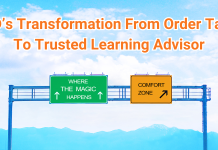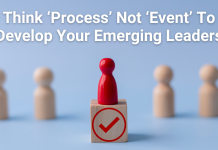
How can hyper cannibalism give us a competitive advantage?
“Disrupt” has become something of a dirty word when it comes to new companies rising in the marketplace. Apps, drones, automation, and delivery systems have all sunk stalwart companies time and again, all because they did not have the foresight to jump onboard new technology and innovation. What are some methods to avoiding these pitfalls, and to start thinking ahead?
Shawn Kanungo has been recognized globally for his work in the area of innovation. He shares his hands-on experiences through talks around the world to help leaders navigate change within this crazy digital era we're all living in. In 2016, he was named Avenue Magazine's top 40 under 40 list. He also co-hosts The Dip, a podcast focused on strategy, marketing and innovation. I recently interviewed Shawn for the LEADx Podcast, where we talked careers, companies, and cannibalism. (The interview below has been lightly edited for space and clarity.)
Kevin Kruse: You say that to be innovative we need to think like a cannibal. What do you mean by that?
Shawn Kanungo: Well, you know, here's the punchline: organizations are designed to be operationally efficient and operationally effective. That's why we had really great processes and structure and governance and 30-minute meetings in cubicles. In the industrial revolution in the industrial age, people would look at our organizations today and they would say, “Wow. You ran these organizations like a well-oiled machine. You guys are super efficient.” In today's world, we haven't really organized. We haven't really designed our organizations to evolve, to rethink our products, our services, and how we deliver information to our customers. We haven't designed our organizations to evolve. This idea of thinking like a cannibal basically means not to be so romantic about what's working today and continuously thinking about how will you disrupt what's working today in order to build a brighter in the future tomorrow.
A really simple example is Netflix. It's something that everybody has. Reed Hastings, the CEO of Netflix, one of the hardest decisions that he ever had to make as the CEO of Netflix is when they were going from the DVD to streaming. Netflix was never sold on DVDs as ‘our ticket.’ We're going to live and die on DVDs. The hardest decision that he had to make was when he literally had to kick out his DVD team from the main management meeting that he had because the DVD team wasn't open to this whole idea of streaming. They weren't open to all this innovation and essentially, what would disrupt their business. At the time, the DVD team was making all the revenue and profit for the organization, and Reed had to kick them out of the meeting because they weren't open to it.
If you look at organizations today, many organizations have been around for 40, 50, 60 years, essentially doing the same thing. Today, technology is on an exponential scale. Now, you actually have to rethink your organization. You actually have to rethink how you do things because the world has changed. For me, I'm an innovation strategist, and my job requires me to go into organizations to challenge the status quo. My job is to show organizations how I would take them out of business before somebody else does. You know, this is what people struggle with. They spend all their lives working on this business and working on the products that they're working on, not knowing that maybe that might not be relevant to the future. It's actually a hard thing to stomach.
Kruse: I've read stats about how few Fortune 500 companies from decades ago are still around today.
Kanungo: Ninety percent of the companies on the Fortune 500 in 1955 are no longer on the list today.
Kruse: So you explain to them how you would put them out of business, right? So they can get ahead of the curve.
Kanungo: Yes. I think it goes beyond. Actually, I want to ask you this question because I want to continue on this fact. Not only from an organizational standpoint, but from an individual standpoint. It's because you, Kevin, you're the master of productivity. This is what people know you as, in terms of how to get that extra 5%, 10% out of your day. What I'm trying to challenge organizations with is not the 5% to 10%. It's actually how do you get the five to 10 times increase? I guess when it comes to you and what people ask you about productivity, is that part of what you're trying to do? It's trying to radically rethink how they do things?
Kruse: Well, I think they have to. You really need to become a cannibal and realize you have to kill the most successful parts of your business with something better, right?
Kanungo: Exactly. Totally right. You just sparked something in me, thinking about listening to your podcast over time. I remember the number one productivity hack from Mark Cuban was actually to remove meetings. This is what I learned from your podcast, and you know what I did afterwards? I looked at all my meetings, and I said, “Which are the ones that I actually don't need to be part of or I'm not going to add value on?” I can't tell you how amazing that piece of advice was. I have to thank you for that.
Kruse: That's great that you took some action on it.
Kanungo: Yes, absolutely. Here's the other thing that I would say. We're talking about organizations. I think this idea of becoming a cannibal actually translates into your own career. You know, my parents, I'm East Indian. As East Indian, growing up in North America, you were always told the only things that you could do is become a doctor, engineer, accountant or lawyer. This is the only thing that you could do, or you could marry a doctor. These jobs are safe. That's what they think. These jobs are safe. The crazy thing is that now that technology's on an exponential scale, those jobs actually aren't safe anymore. Those jobs are being disrupted by the democratization of information and automation and all that stuff. I think if you think about your career, you consistently have to be learning, you have to be hungry and curious.
Just a quick story, I was helping an organization with a training strategy for adult education. I was helping them with their strategy on what does the future of training, future of education look like to you? There were three or four trainers, and they had a team of 12. I told them that one of the things they have to learn very simply was to learn how to edit, cut and produce a video. As a trainer, that's what you should be doing. They told me, “Shawn, when do we have the time to do this? We're already busy. Our calendars are already full.” I told them, “Do you want a career in training, because if you are not prepared to take the extra effort to learn about what's going to be disrupting your career or your business, the market is going to run over you.” It's harsh to say that if you don't learn, if you're not hungry to think about what's next, the market will run over you. You'll be out of luck.
Kruse: It's going to be tough for everybody with automation. You have to be able to reinvent yourself.
Kanungo: Kevin, what do you think about this, because we're going to be in a very challenging spot in our economy. What are your thoughts on this idea that the robots are coming? People are going to be losing their jobs. What is that going to do in our economy? What is that going to do on things like retirement and pension and some of these things? I'd love to get your thoughts on this.
Kruse: The wealth gap is getting bigger. It's hard to imagine that we can't keep the society together without a basic universal income. What do you think?
Kanungo: You know what? This basic universal income is interesting. I've heard the government's thinking about this too. Here's what I think. You know, technology has always been around. It's always disrupted jobs. You know, there used to be some really nice people. They used to be switchboard operators. When the phone technology got really good, they went home. There used to be some really nice guys. They used to be milkmen. When the supply chain of the supermarkets got really good, they went home too. Jobs will always be disrupted by new technologies. For the most part, technology has actually created new jobs. It has actually assisted us to do more. People talk about this idea of, “Oh, things are going to be more automated. We're going to have more time for ourselves.” That has never happened. We are still working our asses off, and that will continue to happen. I think that's just human nature. We will continuously find new things to do. We'll try to get faster and better and more efficient with more technology. There is no part of this where technology is going to come in, and we're going to chill. We're going to relax.
One of the things that I do is I work with governments, really leading the charge on digital governments. How do you enable innovation, not only within your organization and within government, but also play with the ecosystem. Play with all these new technologies that are coming about and allowing technology and society to move along in a way that is amicable and it works. I think governments have to be more proactive around this. They have to wake up, because if they don't understand the changes that are happening, we're going to be in a tough spot. I think it's industry, government, and entrepreneurs who work together on all this innovation stuff.
Kruse: You’re young and accomplished, what advice would you have for people who are just starting out in their careers?
Kanungo: You know, for me, and I appreciate that. Ninety-nine percent of your listeners will not know who I am, so I just started my career in this space, 11 years in the innovation space and counting. For me, it's actually being obsessed with what I do. I've been fortunate, so I found something that I'm completely obsessed with. I read, write, work and speak on in terms of innovation, and it's everything to me. You know, I guess that's what's helped me in my career. It's if people know that I'm obsessed about this and they know that I am going to roll up my sleeves and help them with digital disruption and help them with digital transformation. They know they're getting somebody that knows their stuff and is passionate at what they do. I think at the end of the day, the advice that I'll have is to really find what you're passionate about and what you're obsessed about. Then, you can help people or help yourself advance your career.
I think the advice that I would give people—and I just gave this to somebody—somebody called me, and they said, “I want to be in your position. I want to work in strategy, in innovation. I want to do what you do.” I said to him, “If you want to get a career in this space, do work for free. Reach out to leaders in the space that you want to be and literally put up your hands and do work for free, because I know 99.9% of the world will not do that.” Ninety-nine percent of people will meet me for coffee, and they'll want to work with me. They'll want to work for us. I give this advice. “Do you want to help us out? Do you want to help some of these leaders out? Do some work for free and show people what you can do and how you can help them.” I promise you, most people won't take that advice. The people that do will always get ahead. That's how I've gone ahead in my career.
It's that anytime anybody had some creative juice that had to do with innovation, I always put up my hand, whether it was working on the weeknights or weekends to literally build my brand in this particular space. Because of that hustle around my passion, that's why I've gone to where I am. Most people are not willing to take that step. They're not willing to take that effort. Love to get your thoughts on this too. Why is that?
Kruse: Right, go volunteer. Go intern for free. Go carry somebody's bag as they travel just so soak up everything that's going on around them.
Kanungo: I should be carrying your bag, Kevin. If there's an opening to carry your bag, please let me know.
Kruse: That's hilarious, Shawn. I always like to challenge our listeners to get 1% better every single day, so what can we do today?
Kanungo: Yes, so for those of you who are listening to this podcast, going to work in the morning or you're getting into the office or you're at your workout and taking a run right before going into the office. What I would say is try to get yourself fired today. Do something that might get you fired today, and that just means taking a risk. Maybe executing an idea that everybody has been dancing around and trying out. Maybe it's booking that meeting with your boss or your main client and really showing them your value. I want you to try to get yourself fired today, because what you'll realize is that at the end of the day, you won't get fired. You'll actually take a huge risk. That will actually add value to your job or to your career. We go throughout our days playing the mediocre game. If you actually leap outside of that and take a chance and step outside your comfort zone, you will feel something special.
—
Kevin Kruse is a New York Times bestselling author, host of the popular LEADx Leadership Podcast, and the CEO/Founder of LEADx.org, which provides free world-class leadership training, professional development and career advice for anyone, anywhere.





